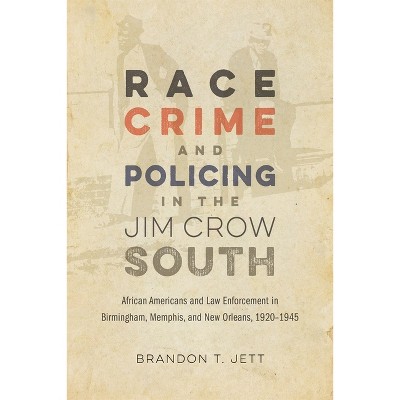$45.00 when purchased online
Target Online store #3991
About this item
Highlights
- From the late nineteenth century to the dawn of the civil rights era, the Churches of Christ operated outside of conventional racial customs.
- About the Author: Barclay Key is associate professor of history at the University of Arkansas at Little Rock.
- 264 Pages
- Religion + Beliefs, History
- Series Name: Making the Modern South
Description
About the Book
"From the late nineteenth century to the dawn of the civil rights era, the Churches of Christ sometimes operated outside of conventional racial customs. Many congregations, even deep in the South, counted whites and blacks among their numbers. As the civil rights movement began to challenge pervasive social views about race, Church of Christ leaders and congregants found themselves in the midst of turmoil. In "Race and Restoration: Churches of Christ and the Black Freedom Struggle," Barclay Key focuses on how these churches managed race relations during the Jim Crow era and how they adapted to the dramatic changes of the 1960s. Although all religious organizations grappled with changing attitudes toward race, Churches of Christ had singular struggles. Fundamentally "restorationist," these exclusionary churches perceived themselves as the only authentic expression of Christianity, compelling them to embrace peoples of different races, even as they succumbed to prevailing racial attitudes. As a case study, Churches of Christ offer a unique perspective for observing how Christian fellowship and human equality intersected during the civil rights era. Key reveals how racial attitudes and practices within individual congregations elude the simple categorizations often employed by historians. Public forums, designed by churches to bridge racial divides, offered insight into the minds of members while revealing the limitations of changes made by individual churches. Although Churches of Christ did have a more racially diverse composition than many other denominations in the Jim Crow era, Key shows that their members were subject to many of the same aversions, prejudices, and fears of other churches of the time. Ironically, the tentative biracial relationships that had formed within and between congregations prior to World War II began to dissolve as leading voices of the civil rights movement prioritized desegregation"--Book Synopsis
From the late nineteenth century to the dawn of the civil rights era, the Churches of Christ operated outside of conventional racial customs. Many of their congregations, even deep in the South, counted whites and blacks among their numbers. As the civil rights movement began to challenge pervasive social views about race, Church of Christ leaders and congregants found themselves in the midst of turmoil. In Race and Restoration: Churches of Christ and the Black Freedom Struggle, Barclay Key focuses on how these churches managed race relations during the Jim Crow era and how they adapted to the dramatic changes of the 1960s.
Although most religious organizations grappled with changing attitudes toward race, the Churches of Christ had singular struggles. Fundamentally "restorationist," these exclusionary churches perceived themselves as the only authentic expression of Christianity, compelling them to embrace peoples of different races, even as they succumbed to prevailing racial attitudes. The Churches of Christ thus offer a unique perspective for observing how Christian fellowship and human equality intersected during the civil rights era. Key reveals how racial attitudes and practices within individual congregations elude the simple categorizations often employed by historians. Public forums, designed by churches to bridge racial divides, offered insight into the minds of members while revealing the limited progress made by individual churches. Although the Churches of Christ did have a more racially diverse composition than many other denominations in the Jim Crow era, Key shows that their members were subject to many of the same aversions, prejudices, and fears of other churches of the time. Ironically, the tentative biracial relationships that had formed within and between congregations prior to World War II began to dissolve as leading voices of the civil rights movement prioritized desegregation.Review Quotes
This is a carefully written study that embraces the messiness of human life, while simultaneously maintaining a fluid, engaging style. Scholars attuned to the importance of religion as a lens for social, cultural, and political analysis will appreciate Key's fresh insights on the complex interplay between race and faith in an understudied institution common across the American South.--Sean P. Cunningham, author of "American Politics in the Postwar Sunbelt: Conservative Growth in a Battleground Region"
About the Author
Barclay Key is associate professor of history at the University of Arkansas at Little Rock.Dimensions (Overall): 9.0 Inches (H) x 6.0 Inches (W) x .75 Inches (D)
Weight: 1.22 Pounds
Suggested Age: 22 Years and Up
Number of Pages: 264
Series Title: Making the Modern South
Genre: Religion + Beliefs
Sub-Genre: History
Publisher: LSU Press
Format: Hardcover
Author: Barclay Key
Language: English
Street Date: May 6, 2020
TCIN: 88994145
UPC: 9780807172742
Item Number (DPCI): 247-58-1017
Origin: Made in the USA or Imported
If the item details aren’t accurate or complete, we want to know about it.
Shipping details
Estimated ship dimensions: 0.75 inches length x 6 inches width x 9 inches height
Estimated ship weight: 1.22 pounds
We regret that this item cannot be shipped to PO Boxes.
This item cannot be shipped to the following locations: American Samoa (see also separate entry under AS), Guam (see also separate entry under GU), Northern Mariana Islands, Puerto Rico (see also separate entry under PR), United States Minor Outlying Islands, Virgin Islands, U.S., APO/FPO
Return details
This item can be returned to any Target store or Target.com.
This item must be returned within 90 days of the date it was purchased in store, shipped, delivered by a Shipt shopper, or made ready for pickup.
See the return policy for complete information.
Trending Poetry

Bestseller
$24.48
MSRP $35.00
Buy 2, get 1 free select books, movies, music & Funko
4.6 out of 5 stars with 33 ratings

Bestseller
$14.39
Buy 2, get 1 free select books, movies, music & Funko
3.8 out of 5 stars with 63 ratings

$22.80
was $26.60 New lower price
Buy 2, get 1 free select books, movies, music & Funko
5 out of 5 stars with 4 ratings

$23.09
Buy 2, get 1 free select books, movies, music & Funko
4.6 out of 5 stars with 16 ratings

$23.09
Buy 2, get 1 free select books, movies, music & Funko
4.2 out of 5 stars with 19 ratings

Highly rated
$9.85 - $23.09
MSRP $15.99 - $32.99
Buy 2, get 1 free select books, movies, music & Funko
4.8 out of 5 stars with 138 ratings
Discover more options

$45.00
Buy 2, get 1 free select books, movies, music & Funko
5 out of 5 stars with 1 ratings





